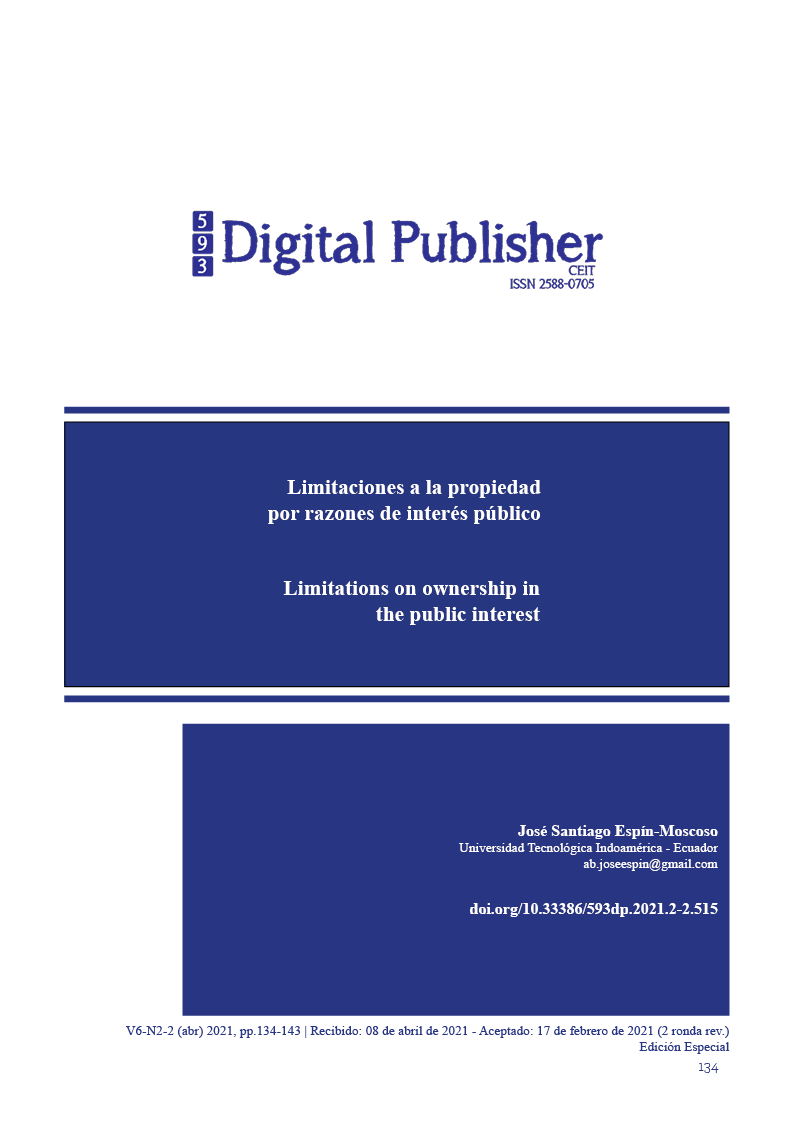Limitations on ownership in the public interest
Main Article Content
Abstract
The development of this work is based on the analysis between what is a thing and a good from the perspective of the State. Consequently, the implications that exist around the public domain will develop. In this sense, it is concluded that there are State assets that have a special legal regime.
The State for reasons of public interest will always have mechanisms for the protection of its assets. But what happens with the property of private persons, it will be necessary to determine how these protection mechanisms are executed, since their property belongs to another regime, to the private domain.
In this sense, the author questions whether the right to private property is absolute, if the fact that a person owns a good implies that no one will be able to affect their property. To do this, through the deductive method, in the first instance the nature of goods and things will be analyzed, to land on the study of the characteristics of public and private domain goods, questioning certain relationships that exist between them, determining how As a result, ownership over them is not always absolute.
In addition, the differentiation between public domain and private domain will be analyzed in order for our study to be able to determine whether in general the right to property has limits, or whether it is enough to show the spirit and title of owner so that the owner of a good, enjoy it without any limitation.
Downloads
Article Details

This work is licensed under a Creative Commons Attribution-NonCommercial-ShareAlike 4.0 International License.
1. Derechos de autor
Las obras que se publican en 593 Digital Publisher CEIT están sujetas a los siguientes términos:
1.1. 593 Digital Publisher CEIT, conserva los derechos patrimoniales (copyright) de las obras publicadas, favorece y permite la reutilización de las mismas bajo la licencia Licencia Creative Commons 4.0 de Reconocimiento-NoComercial-CompartirIgual 4.0, por lo cual se pueden copiar, usar, difundir, transmitir y exponer públicamente, siempre que:
1.1.a. Se cite la autoría y fuente original de su publicación (revista, editorial, URL).
1.1.b. No se usen para fines comerciales u onerosos.
1.1.c. Se mencione la existencia y especificaciones de esta licencia de uso.
References
Dromi, R. (1985). Derecho Administrativo Económico. Buenos Aires: Editorial Astrea, 1985.
Dromi, R. (1996). Derecho Administrativo. Buenos Aires: Ediciones Ciudad Argentina.
García, E. (1954). Sobre la Imprescriptibilidad de Dominio Público Revista de Administración Pública.
Gordillo, A. (2014). Tratado de Derecho Administrativo y Obras Selectas. Buenos Aires: Fundación de Derecho Administrativo.
Jaramillo H. (2005). Manual de Derecho Administrativo. Loja: Universidad Nacional de Loja.
Marienhoff, M. (1988). Tratado de Derecho Administrativo. Tomo V. Buenos Aires: Abeledo-Perrot.
Marienhoff, M. (1960). Tratado del Dominio Público. Buenos Aires: Tipográfica Editora Argentina.
Parada, R. (2010). Derecho Administrativo III, Bienes Públicos, Derecho Urbanístico . Madrid: Marcial Pons Ediciones Jurídicas y Sociales S.A.
Parejo Alfonso, L. (2014). Lecciones de Derecho Administrativo. Valencia: Tirant Lo Blanch.
Peñailillo D. (2006) Los bienes, la propiedad y otros derechos reales. Santiago: Editorial Jurídica de Chile.
Pérez, E. (2009). Derecho Administrativo. Quito: Corporación de Estudios y Publicaciones.
Rebaza, W. (2008). Acerca del dominio público y el dominio privado del Estado. A propósito de sus definiciones en la Nueva Ley General del Sistema Nacional de Bienes Estatales y su Reglamento. Revista Derecho & Sociedad.
Rodríguez Undurraga, A. A. (1974). Los Bienes y los Derechos Reales. Santiago: Editorial Nascimento.
Sayagues E. (2002). Tratado de Derecho Administrativo. Montevideo: Fundación de Cultura Universitaria.
Secaira, P. (2004). Curso breve de derecho administrativo. Quito: Editorial Universitaria.
Zavala J. (2000). La unidad jurisdiccional Revista Iuris Dictio.


